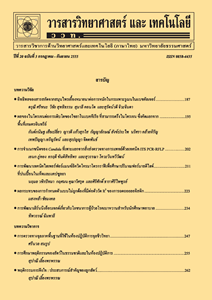อิทธิพลของการเสริมใบมะรุมผงในอาหารไก่ไข่ต่อสมรรถภาพการผลิตและคุณภาพไข่
Main Article Content
Abstract
บทคัดย่อ
การวิจัยนี้มีวัตถุประสงค์เพื่อศึกษาผลของการเสริมใบมะรุมผงในอาหารไก่ไข่ต่อสมรรถนะการให้ผลผลิต และคุณภาพไข่ โดยวางแผนการทดลองแบบสุ่มสมบูรณ์ ประกอบด้วยอาหารทั้งหมด 4 สูตร คือ สูตรควบคุม (ไม่เสริมใบมะรุมผง) และอาหารที่เสริมใบมะรุมผงที่ระดับ 2, 4 และ 6 เปอร์เซ็นต์ ตามลำดับ โดยวิจัยในไก่ไข่พันธุ์อิซาบราวน์ ที่อายุ 26 สัปดาห์ จำนวน 200 ตัว โดยสุ่มไก่ออกมาเป็นกลุ่มกลุ่มละ 10 ตัว จำนวน 20 กลุ่ม อาหารแต่ละสูตรจะถูกสุ่มให้แต่ละกลุ่มเป็นเวลา 8 สัปดาห์ ซึ่งอาหารทุกสูตรมีโปรตีนและพลังงานที่ใช้ประโยชน์ได้ใกล้เคียงกัน จากการศึกษาผลของการเสริมใบมะรุมผงในอาหารไก่ไข่พบว่าการเสริมใบมะรุมผงที่ระดับ 0, 2, 4 และ 6 เปอร์เซ็นต์ ทำให้ปริมาณอาหารที่กิน น้ำหนักไข่เฉลี่ย และมวลไข่ มีความแตกต่างกันอย่างไม่มีนัยสำคัญทางสถิติ (P>0.05) แต่พบว่ากลุ่มที่เสริมใบมะรุมผงที่ระดับ 0 และ 2 เปอร์เซ็นต์ ทำให้ผลผลิตไข่และประสิทธิภาพการใช้อาหารต่อการผลิตไข่ 1 กิโลกรัม ดีกว่ากลุ่มที่เสริมใบมะรุมผงที่ระดับ 4 และ 6 เปอร์เซ็นต์ (P<0.05) ด้านคุณภาพไข่พบว่าไก่ไข่ที่ได้รับใบมะรุมผงที่ระดับ 0, 2, 4 และ 6 เปอร์เซ็นต์ ในสูตรอาหาร มีสีเปลือกไข่ ความหนาเปลือกไข่ น้ำหนักเปลือกไข่ น้ำหนักไข่แดง น้ำหนักไข่ขาว ความสูงไข่ขาว และค่าฮอฟ์ยูนิตแตกต่างกันอย่างไม่มีนัยสำคัญทางสถิติ (P>0.05) แต่พบว่ากลุ่มที่เสริมใบมะรุมในอาหารจะมีสีไข่แดงเข้มกว่ากลุ่มที่ไม่เสริมใบมะรุม (P<0.05) ซึ่งจากการวิจัยสรุปได้ว่าใบมะรุมผงสามารถนำมาใช้เป็นวัตถุดิบอาหารสำหรับไก่ไข่ได้ เนื่องจากมีปริมาณโปรตีนและพลังงานค่อนข้างสูง และไม่ส่งผลเสียต่อสุขภาพของไก่และคุณภาพไข่ ยิ่งไปกว่านั้นใบมะรุมผงสามารถเพิ่มสีไข่แดง
คำสำคัญ : ใบมะรุม; ไก่ไข่; ผลผลิตไข่; คุณภาพไข่
Abstract
The objective of this study was to determine the effects of Moringa oleifera leaf powder supplementation in layer diet on egg production and egg quality. This experiment was designed as completely randomized design (CRD). The experimental diets were control (no Moringa oleifera leaf powder) and supplemented with Moringa oleifera leaf powder at 2, 4 and 6 %, respectively. Two hundred Isa brown laying hens at 26 weeks of age were devided into 4 treatments, each with 5 groups (10 birds per group). Each group was randomed to each treatment for 8 weeks. All diets were isonitrogenous and isocaloric. The results of the effect of supplemen-tation with Moringa oleifera leaf powder at 0, 2, 4 and 6 % found that feed intake, egg weight and egg mass were not significantly different among treatments (P>0.05). However, supplementation with Moringa oleifera leaf powder at 0 and 2% cause egg production performance and feed conversion ratio were greater when compare with the other treatments (P<0.05). Shell color, shell thickness, shell weight, yolk weight, albumen weight, albumen height and haugh unit were not significantly different among treatments (P>0.05) but yolk color was found to be increased in birds consumed the diets supplemented with Moringa oleifera leaf powder at 2, 4 and 6 % when compared to control diet (P<0.05). In conclusion, Moringa oleifera leaf can be used as feedstuff for laying hens, owing to the high content of protein and gross energy and no adversely affect to health and egg quality. Furthermore, dietary supplementation of Moringa oleifera leaf powder increased yolk color.
Keywords: Moringa oleifera leaf; laying hen; egg production; egg quality


